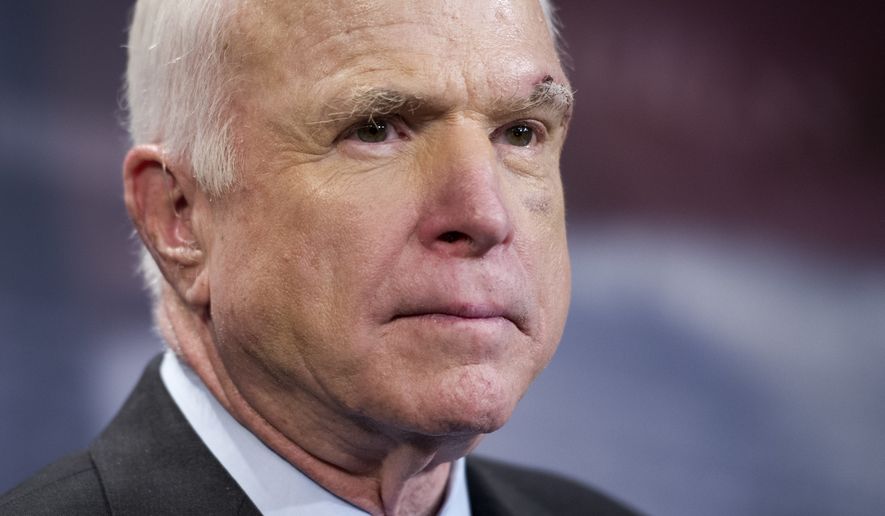The associate of John McCain who spread anti-Trump dossier claims around Washington post-election planned to leak a story to Washington Post columnist David Ignatius about Paul Manafort, according to court testimony.
Mr. Ignatius wrote the Jan. 12, 2017 column that eventually doomed retired Lt. Gen. Michael Flynn, Mr. Trump’s first and brief national security adviser. The source was an Obama administration official, Mr. Ignatius wrote.
The McCain evidence emerged in July in a London courtroom, where dossier creator Christopher Steele faces a defamation lawsuit from a Russian CEO. Mr. Steele compiled the dossier for the Democratic Party. After Donald Trump won the presidency Mr. Steele provided memo copies to the Republican McCain and his associate David J. Kramer.
Trial evidence showed that Mr. Kramer not only took the dossier to the Obama White House and news media, he also tried to help reporters confirm its dozen or so felony allegations against Mr. Trump.
Mr. Kramer and Mr. Steele engaged in across-the-Atlantic messaging as the former State Department official would receive followup questions from reporters and relay them to the former British intelligence officer.
Andrew Caldecott, the attorney for Russian Aleksej Gubarev, read in court messages between Mr. Kramer and Mr. Steele, according to transcripts obtained by The Washington Times.
“The Flynn calls story is picking up legs,” Mr. Kramer says. This is a reference to the Ignatius column that Mr. Flynn had spoken to Russian ambassador Sergey Kislyak during the transition.
Then Mr. Kramer tells Mr. Steele, “I think it’s time to get that other [Manafort] story out there. Get some sleep. Best, D [avid].”
“Thanks.”
Mr. Kramer says, “And Ignatius is the one I’ll feed it to.”
By then, the dossier had been published by BuzzFeed. Mr. Steele alleged that Mr. Manafort, the campaign manager, and volunteer Carter Page worked as a team to conspire with the Kremlin on election interference.
Special Counsel Robert Mueller’s March 2019 report disproved this claim. The two men did not know each other.
Mr. Ignatius has written columns on Manafort’s political consulting in Ukraine. Manafort was convicted of tax fraud for not reporting the income. He was not accused of election conspiracy.
The Jan. 12, 2017 column, citing a “senior U.S. government official,” disclosed the Flynn-Kislyak calls intercepted by U.S. intelligence. Flynn pleaded guilty later that year to lying to the FBI about whether economic sanctions were discussed.
Mr. Kramer also worked with reporters in late 2016 and early 2017 to try to prove the notorious Prague tale, another Steele dossier claim.
As the Steele story goes, then-Trump attorney Michael Cohen secretly traveled to the eastern European city in August 2016 to meet Vladimir Putin aides and pay money to cover up the campaign’s role in computer hacking.
Mr. Cohen immediately denied the story and the FBI later concluded that the trip didn’t happen.
Mr. Kramer was working with reporters from the Wall Street Journal and Washington Post.
Mr. Kramer messaged Mr. Steele: “These are the things that could possibly move the matter forward …He’s anxious to do …. if there is anything to give him.”
The Wall Street Journal reporter tells Mr. Kramer: “I just talked to the Prague guy. He said the Israeli passport does not check out….The Trump people seem to know everything, they will certainly be covering tracks everywhere if this is true because so many people have been asking about it.”
Mr. Kramer also tells Steele, “Don’t have the sense that the Post is on the verge. Will check again tomorrow.”
Mr. Caldecott said in court, “Now, we suggest that Mr Kramer was working his socks off, collecting detailed enquiries from the media, referring them to you, and reporting back, and effectively he was acting as your agent for communicating with the media whom you did not personally want to meet.”
The alleged defamation occurred in a December 2016 memo, the dossier’s last. Mr. Steele accused Mr. Gubarev of hacking into Democratic Party computers under pressure from Russian intelligence.
Mr. Gubarev, a global computer server provider, immediately denied the charge and filed the libel case against Mr. Steele and his Orbis Business Intelligence. The FBI says the cyber crimes were committed by Russian military intelligence.
The Gubarev lawyer is trying to show the judge that Mr. Steele was an active participant in selling reporters on the dossier. Mr. Caldecott said Mr. Steele failed to disclose, as required, that he repeatedly communicated with the BuzzFeed reporter who acquired the BuzzFeed copy by photographing the one held by Mr. Kramer.
On the stand, Mr. Steele said he did not know why he omitted that fact in evidence discovery responses.
Mr. Steele was also sued by Russian oligarch bankers The same judge in the Gubarev trial ruled he libeled them by alleging they bribed Mr. Putin by delivering large amounts of cash in the 1990s.
Mr. Steele used a single main source for his dossier, U.S.-based Russian national Igor Danchenko.
Mr. Danchenko later told the FBI his sources mostly repeatedly gossip that he fed Mr. Steele.
• Rowan Scarborough can be reached at rscarborough@washingtontimes.com.




Please read our comment policy before commenting.